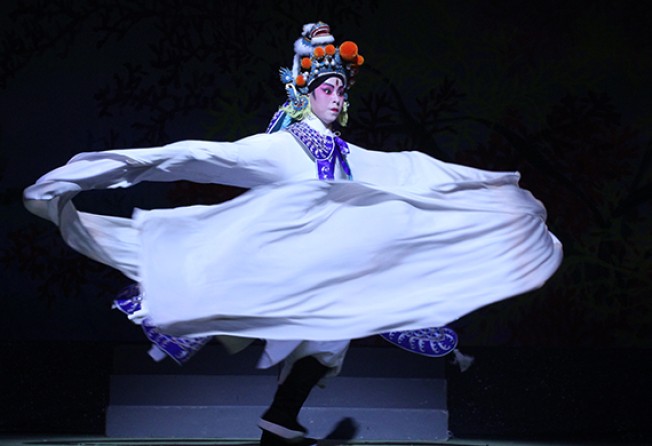HK Magazine: How did you get into Cantonese Opera?
Man Wah: My parents were Cantonese opera artists, so I guess it runs in the family. But even they were not supportive of my decision to become an actress back then, so I had to secretly learn the craft until I finished my university degree to fulfill their expectations. I was a Chinese teacher and then a firewoman, until I returned to school for the full-time Cantonese opera diploma course at the Hong Kong Academy of Performing Arts when it first launched. But when I graduated in 1999 the economy was still in turmoil and there were barely any opportunities for Cantonese opera performers. I wanted to pursue my true passion, so I formed an opera troupe with a few friends shortly after.
HK: Why do you play the male role?
MW: My mother played the male role, so it all occurred naturally to me. It was pretty difficult: The way you walk, your every motion, has to be different from how a woman is played. You have to wear bulky accessories and costumes, and even need to do the martial arts moves. On one especially memorable occasion I had to play the role of a male character pretending to be a woman. This makes the role twice as hard: How am I supposed to change my gender twice?
HK: What do you love about Cantonese opera?
MW: I love Hong Kong; therefore, I love Cantonese opera. It is, in my opinion, the purest embodiment of local culture. The art of Cantonese opera in Hong Kong was unblemished by the Cultural Revolution, so it is still highly authentic. But the content, besides the context, is also why I am so mesmerized with the art: It is all about the idea of “wholeness.” You always get to see some kind of happy ending, where even in tragic stories the protagonists can seek solace in death. Cantonese opera is all about striving to realize the ideal of “humanity”—loyalty, benevolence, filialness and justice. Happiness stems from seeing characters with all these wonderful traits come to life.
HK: What are people missing out on when they tell you they’re not into Cantonese opera?
MW: Those people really don’t understand Cantonese opera. It is much trendier than they think: Even [filmmaker] Stephen Chow’s inspiration comes from Cantonese opera. The way he speaks and his style of black comedy—you can see a bit of Cantonese opera in there. The styles of other renowned film directors, such as the elegance and grandness of Ann Hui On-wah’s work, as well as the artistic and fathomless nature of Wong Kar-wai’s films, all take their aesthetic values from Cantonese opera. Cantonese opera is simply our everyday lives. Everyone keeps ranting about losing their local culture, but it has always been there.
HK: Do you modernize your interpretations of operas?
MW: Cantonese opera is a romantic art form. In the past, people considered committing suicide for “true love” a very idealistic notion, and therefore audiences are totally fine with the protagonist killing himself off after failing to marry his dream girl. I know what you’re thinking—there’s plenty of fish out there, so just find a new one! This is where innovation comes in, as we revamp the story and give it a bit of a modern flair. Audiences are more sophisticated now and demand more. So now we explain to them: social oppression was actually what killed the protagonist.
HK: What is the most valuable lesson you’ve learned from opera?
MW: Life is like a drama, and being an actress means you get to experience all of its feelings within a mere three-hour play. From the prince who feels like he’s on top of the world, with everything in his possession, to losing his wife-to-be and the throne to his brother all in a few hours. It’s like the ups and downs in life condensed! I have learned to let it all wash over me, and not dwell on past troubles. At least I’m not taking it as hard as the characters in the play!
HK: Where do you see the future of Cantonese opera?
MW: If Hong Kong has the resources and demand to support official orchestras and ballet companies, then why not a Cantonese opera troupe as well? There are many opera troupes in Hong Kong, but we each cater to our niche group of audiences—and often really, really small audiences. If Cantonese opera is to thrive and prosper again, then we definitely need an official opera group with regular productions, where actors and producers can be guaranteed prospects and security. At least give them a monthly salary!
The Veteran: Sun Kim-long
The New Blood: Yuen Tak-man

